HRM591: Analyzing the Role of Total Rewards in Staff Motivation
VerifiedAdded on 2022/10/19
|22
|4381
|384
Report
AI Summary
This report examines the critical role of rewards in motivating staff performance within an organization, emphasizing the shift in HRM from viewing labor as a cost to an asset. It delves into motivation theories such as Maslow’s hierarchy of needs, Herzberg’s two-factor theory, and Vroom’s expectancy theory, highlighting the importance of understanding employee needs and expectations. The report differentiates between intrinsic, extrinsic, and social rewards, illustrating how each type contributes to employee motivation and job satisfaction. It further discusses the advantages of implementing an effective reward system, including improved organizational effectiveness, enhanced employee retention, and increased morale. Ultimately, the report underscores the significance of aligning rewards with organizational goals to foster a motivated and high-performing workforce. This assignment solution is available on Desklib, a platform providing students with a wealth of study resources, including past papers and solved assignments.
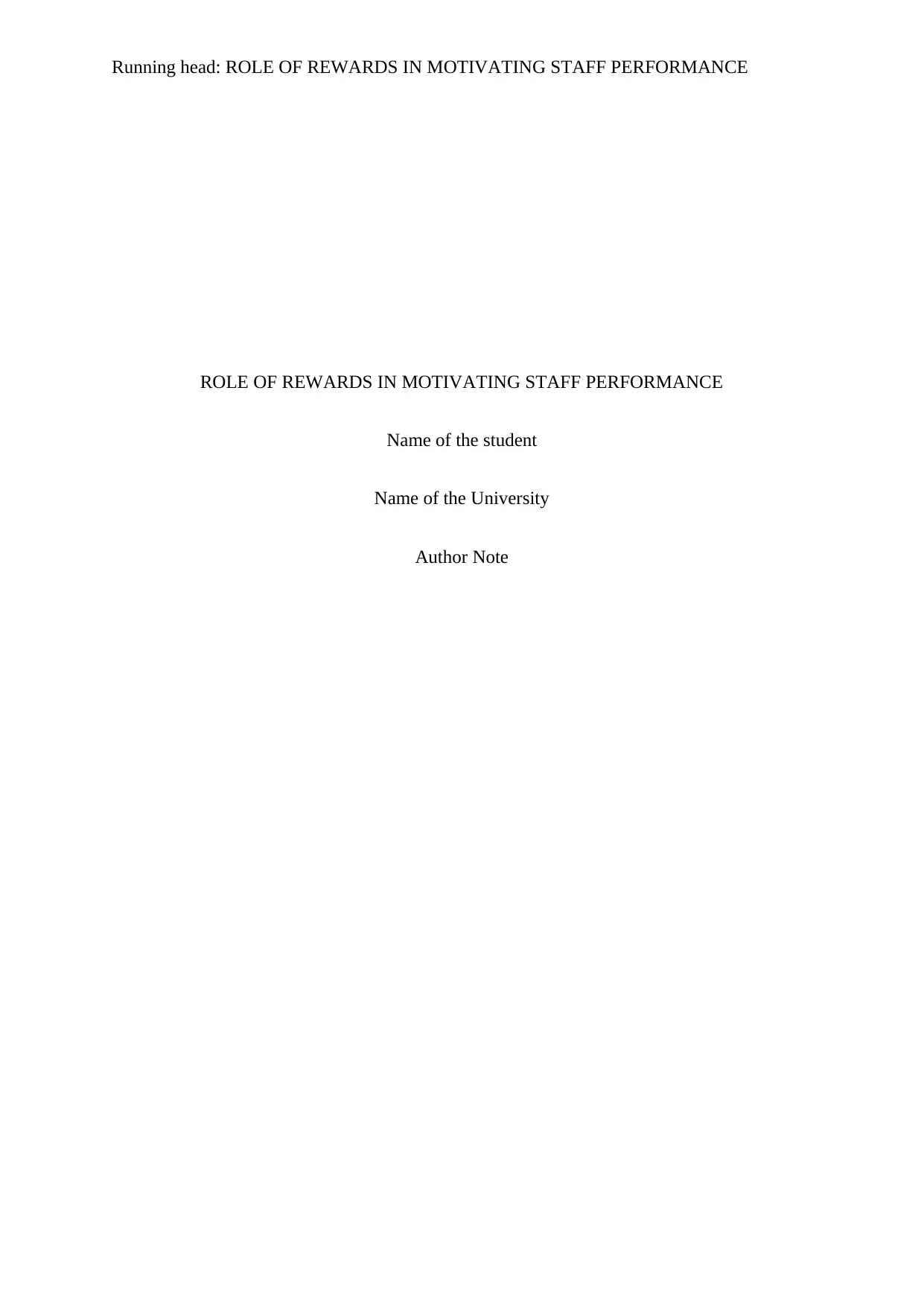
Running head: ROLE OF REWARDS IN MOTIVATING STAFF PERFORMANCE
ROLE OF REWARDS IN MOTIVATING STAFF PERFORMANCE
Name of the student
Name of the University
Author Note
ROLE OF REWARDS IN MOTIVATING STAFF PERFORMANCE
Name of the student
Name of the University
Author Note
Paraphrase This Document
Need a fresh take? Get an instant paraphrase of this document with our AI Paraphraser
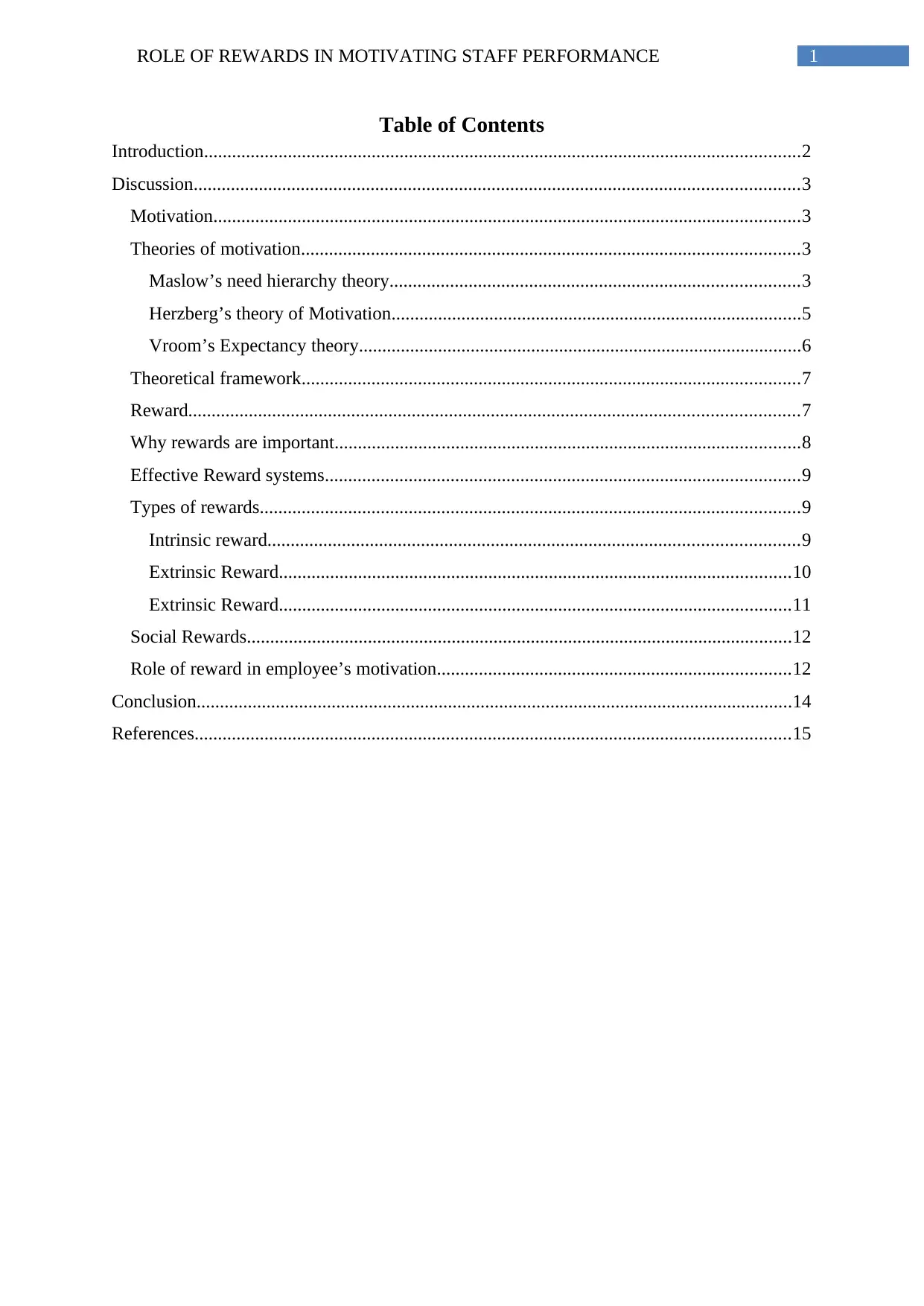
1ROLE OF REWARDS IN MOTIVATING STAFF PERFORMANCE
Table of Contents
Introduction................................................................................................................................2
Discussion..................................................................................................................................3
Motivation..............................................................................................................................3
Theories of motivation...........................................................................................................3
Maslow’s need hierarchy theory........................................................................................3
Herzberg’s theory of Motivation........................................................................................5
Vroom’s Expectancy theory...............................................................................................6
Theoretical framework...........................................................................................................7
Reward...................................................................................................................................7
Why rewards are important....................................................................................................8
Effective Reward systems......................................................................................................9
Types of rewards....................................................................................................................9
Intrinsic reward..................................................................................................................9
Extrinsic Reward..............................................................................................................10
Extrinsic Reward..............................................................................................................11
Social Rewards.....................................................................................................................12
Role of reward in employee’s motivation............................................................................12
Conclusion................................................................................................................................14
References................................................................................................................................15
Table of Contents
Introduction................................................................................................................................2
Discussion..................................................................................................................................3
Motivation..............................................................................................................................3
Theories of motivation...........................................................................................................3
Maslow’s need hierarchy theory........................................................................................3
Herzberg’s theory of Motivation........................................................................................5
Vroom’s Expectancy theory...............................................................................................6
Theoretical framework...........................................................................................................7
Reward...................................................................................................................................7
Why rewards are important....................................................................................................8
Effective Reward systems......................................................................................................9
Types of rewards....................................................................................................................9
Intrinsic reward..................................................................................................................9
Extrinsic Reward..............................................................................................................10
Extrinsic Reward..............................................................................................................11
Social Rewards.....................................................................................................................12
Role of reward in employee’s motivation............................................................................12
Conclusion................................................................................................................................14
References................................................................................................................................15
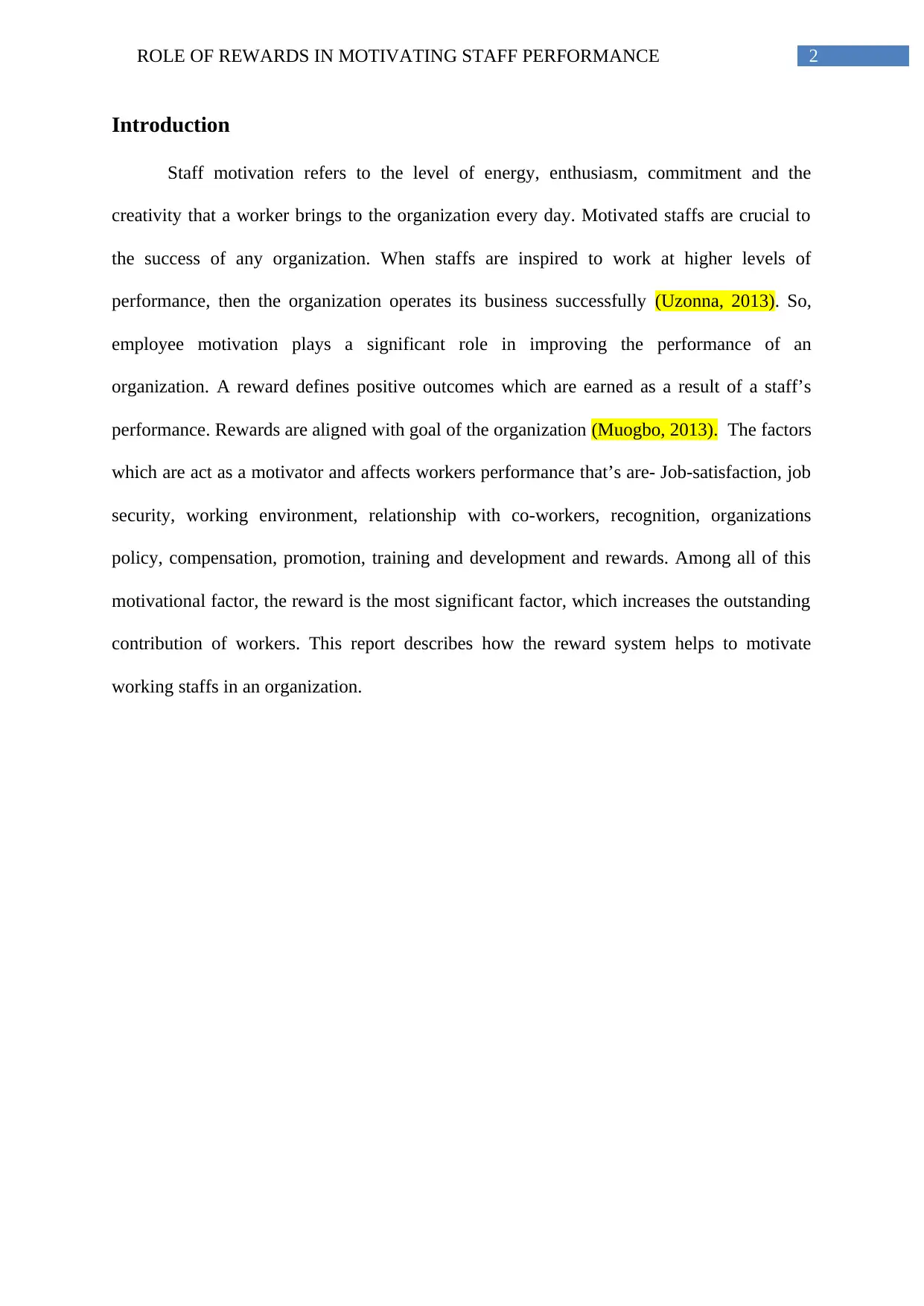
2ROLE OF REWARDS IN MOTIVATING STAFF PERFORMANCE
Introduction
Staff motivation refers to the level of energy, enthusiasm, commitment and the
creativity that a worker brings to the organization every day. Motivated staffs are crucial to
the success of any organization. When staffs are inspired to work at higher levels of
performance, then the organization operates its business successfully (Uzonna, 2013). So,
employee motivation plays a significant role in improving the performance of an
organization. A reward defines positive outcomes which are earned as a result of a staff’s
performance. Rewards are aligned with goal of the organization (Muogbo, 2013). The factors
which are act as a motivator and affects workers performance that’s are- Job-satisfaction, job
security, working environment, relationship with co-workers, recognition, organizations
policy, compensation, promotion, training and development and rewards. Among all of this
motivational factor, the reward is the most significant factor, which increases the outstanding
contribution of workers. This report describes how the reward system helps to motivate
working staffs in an organization.
Introduction
Staff motivation refers to the level of energy, enthusiasm, commitment and the
creativity that a worker brings to the organization every day. Motivated staffs are crucial to
the success of any organization. When staffs are inspired to work at higher levels of
performance, then the organization operates its business successfully (Uzonna, 2013). So,
employee motivation plays a significant role in improving the performance of an
organization. A reward defines positive outcomes which are earned as a result of a staff’s
performance. Rewards are aligned with goal of the organization (Muogbo, 2013). The factors
which are act as a motivator and affects workers performance that’s are- Job-satisfaction, job
security, working environment, relationship with co-workers, recognition, organizations
policy, compensation, promotion, training and development and rewards. Among all of this
motivational factor, the reward is the most significant factor, which increases the outstanding
contribution of workers. This report describes how the reward system helps to motivate
working staffs in an organization.
⊘ This is a preview!⊘
Do you want full access?
Subscribe today to unlock all pages.

Trusted by 1+ million students worldwide
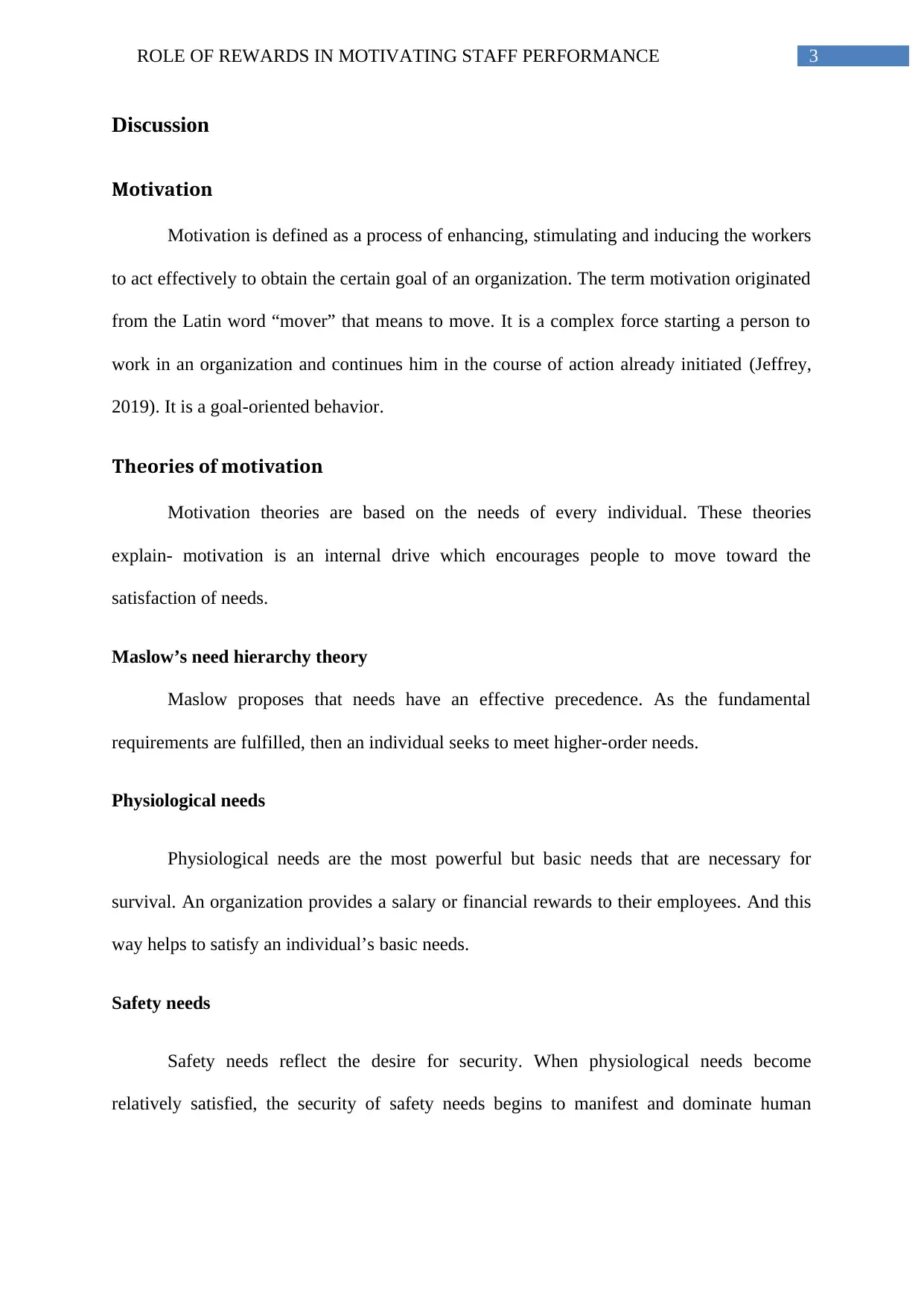
3ROLE OF REWARDS IN MOTIVATING STAFF PERFORMANCE
Discussion
Motivation
Motivation is defined as a process of enhancing, stimulating and inducing the workers
to act effectively to obtain the certain goal of an organization. The term motivation originated
from the Latin word “mover” that means to move. It is a complex force starting a person to
work in an organization and continues him in the course of action already initiated (Jeffrey,
2019). It is a goal-oriented behavior.
Theories of motivation
Motivation theories are based on the needs of every individual. These theories
explain- motivation is an internal drive which encourages people to move toward the
satisfaction of needs.
Maslow’s need hierarchy theory
Maslow proposes that needs have an effective precedence. As the fundamental
requirements are fulfilled, then an individual seeks to meet higher-order needs.
Physiological needs
Physiological needs are the most powerful but basic needs that are necessary for
survival. An organization provides a salary or financial rewards to their employees. And this
way helps to satisfy an individual’s basic needs.
Safety needs
Safety needs reflect the desire for security. When physiological needs become
relatively satisfied, the security of safety needs begins to manifest and dominate human
Discussion
Motivation
Motivation is defined as a process of enhancing, stimulating and inducing the workers
to act effectively to obtain the certain goal of an organization. The term motivation originated
from the Latin word “mover” that means to move. It is a complex force starting a person to
work in an organization and continues him in the course of action already initiated (Jeffrey,
2019). It is a goal-oriented behavior.
Theories of motivation
Motivation theories are based on the needs of every individual. These theories
explain- motivation is an internal drive which encourages people to move toward the
satisfaction of needs.
Maslow’s need hierarchy theory
Maslow proposes that needs have an effective precedence. As the fundamental
requirements are fulfilled, then an individual seeks to meet higher-order needs.
Physiological needs
Physiological needs are the most powerful but basic needs that are necessary for
survival. An organization provides a salary or financial rewards to their employees. And this
way helps to satisfy an individual’s basic needs.
Safety needs
Safety needs reflect the desire for security. When physiological needs become
relatively satisfied, the security of safety needs begins to manifest and dominate human
Paraphrase This Document
Need a fresh take? Get an instant paraphrase of this document with our AI Paraphraser
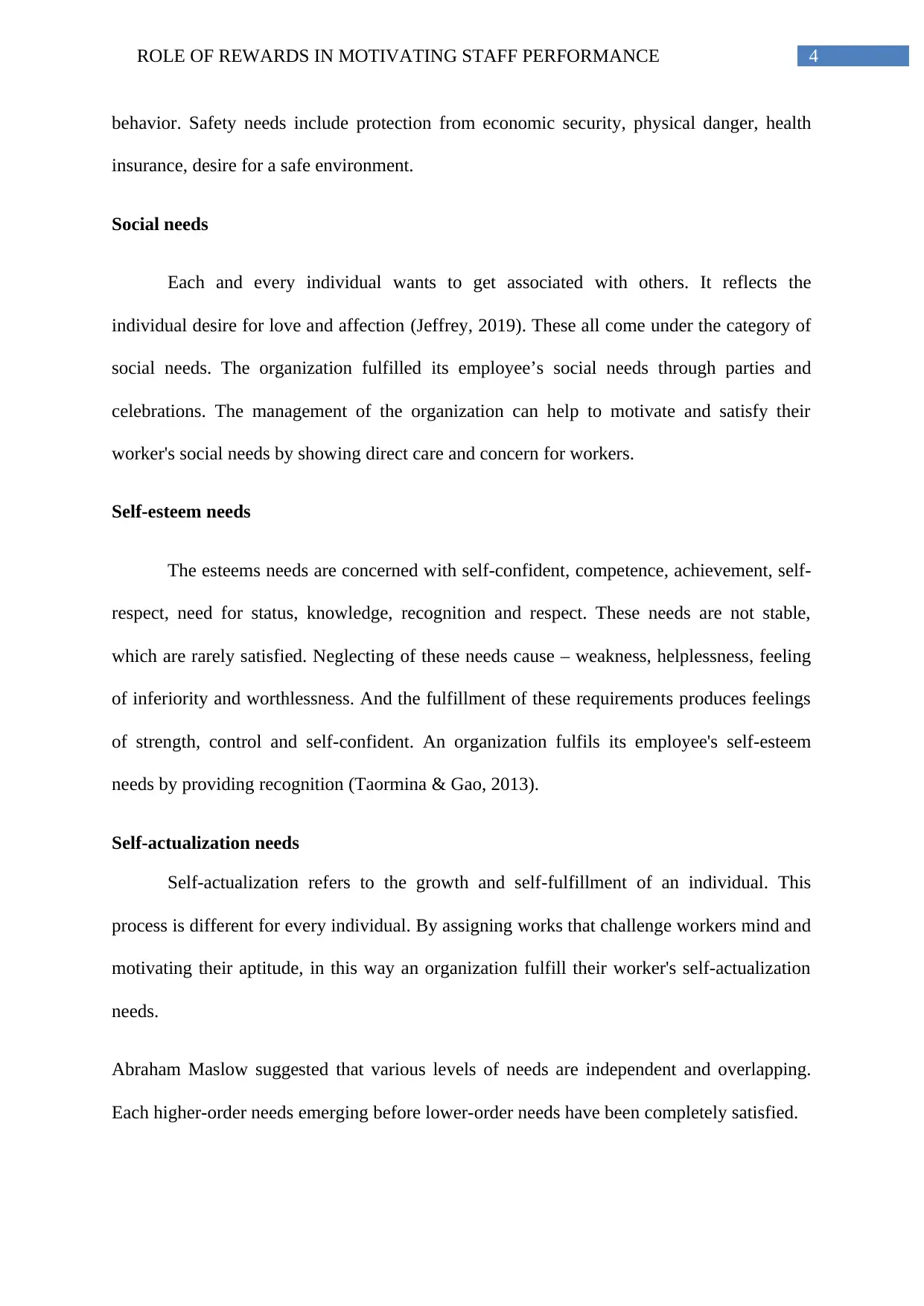
4ROLE OF REWARDS IN MOTIVATING STAFF PERFORMANCE
behavior. Safety needs include protection from economic security, physical danger, health
insurance, desire for a safe environment.
Social needs
Each and every individual wants to get associated with others. It reflects the
individual desire for love and affection (Jeffrey, 2019). These all come under the category of
social needs. The organization fulfilled its employee’s social needs through parties and
celebrations. The management of the organization can help to motivate and satisfy their
worker's social needs by showing direct care and concern for workers.
Self-esteem needs
The esteems needs are concerned with self-confident, competence, achievement, self-
respect, need for status, knowledge, recognition and respect. These needs are not stable,
which are rarely satisfied. Neglecting of these needs cause – weakness, helplessness, feeling
of inferiority and worthlessness. And the fulfillment of these requirements produces feelings
of strength, control and self-confident. An organization fulfils its employee's self-esteem
needs by providing recognition (Taormina & Gao, 2013).
Self-actualization needs
Self-actualization refers to the growth and self-fulfillment of an individual. This
process is different for every individual. By assigning works that challenge workers mind and
motivating their aptitude, in this way an organization fulfill their worker's self-actualization
needs.
Abraham Maslow suggested that various levels of needs are independent and overlapping.
Each higher-order needs emerging before lower-order needs have been completely satisfied.
behavior. Safety needs include protection from economic security, physical danger, health
insurance, desire for a safe environment.
Social needs
Each and every individual wants to get associated with others. It reflects the
individual desire for love and affection (Jeffrey, 2019). These all come under the category of
social needs. The organization fulfilled its employee’s social needs through parties and
celebrations. The management of the organization can help to motivate and satisfy their
worker's social needs by showing direct care and concern for workers.
Self-esteem needs
The esteems needs are concerned with self-confident, competence, achievement, self-
respect, need for status, knowledge, recognition and respect. These needs are not stable,
which are rarely satisfied. Neglecting of these needs cause – weakness, helplessness, feeling
of inferiority and worthlessness. And the fulfillment of these requirements produces feelings
of strength, control and self-confident. An organization fulfils its employee's self-esteem
needs by providing recognition (Taormina & Gao, 2013).
Self-actualization needs
Self-actualization refers to the growth and self-fulfillment of an individual. This
process is different for every individual. By assigning works that challenge workers mind and
motivating their aptitude, in this way an organization fulfill their worker's self-actualization
needs.
Abraham Maslow suggested that various levels of needs are independent and overlapping.
Each higher-order needs emerging before lower-order needs have been completely satisfied.
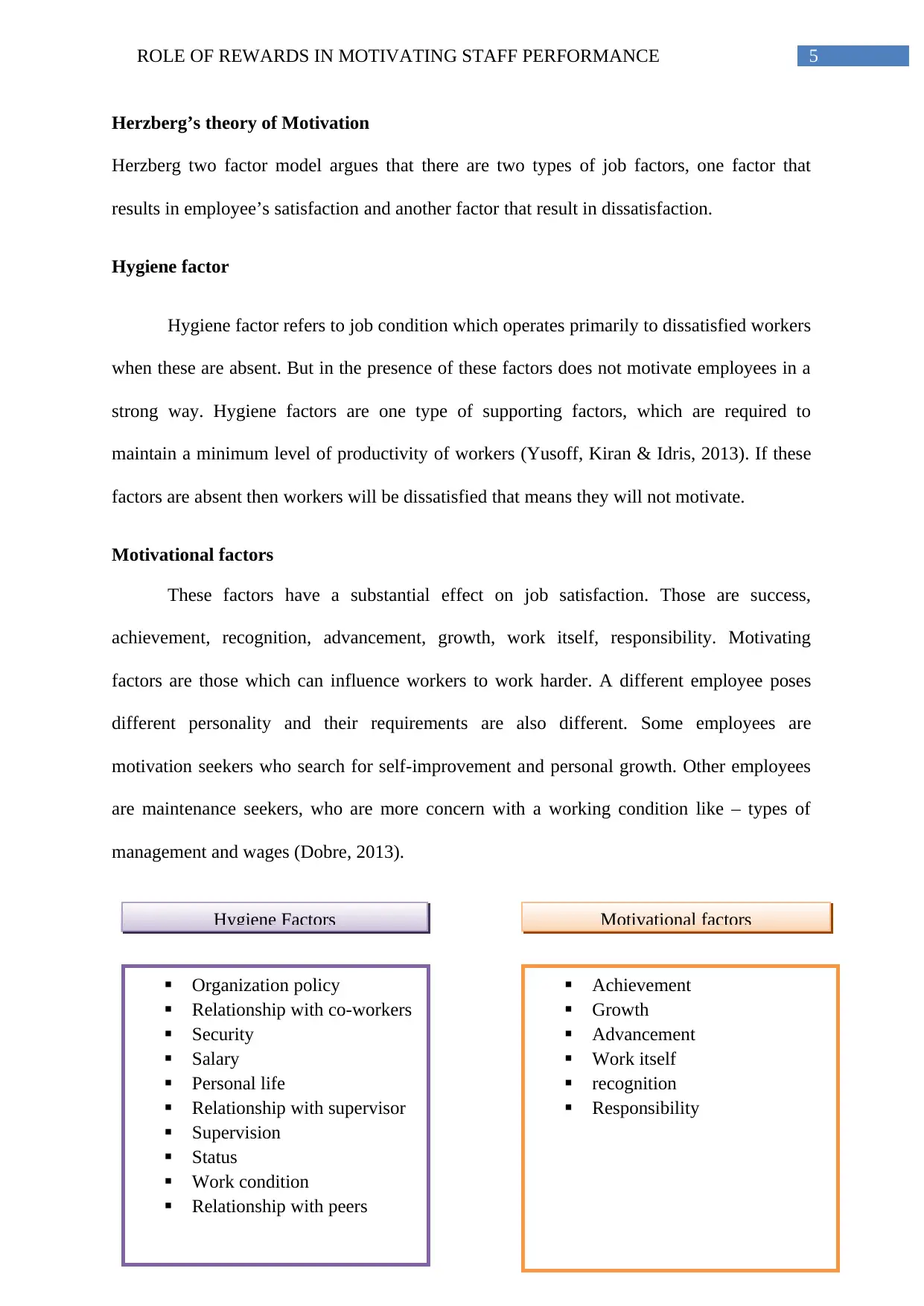
5ROLE OF REWARDS IN MOTIVATING STAFF PERFORMANCE
Herzberg’s theory of Motivation
Herzberg two factor model argues that there are two types of job factors, one factor that
results in employee’s satisfaction and another factor that result in dissatisfaction.
Hygiene factor
Hygiene factor refers to job condition which operates primarily to dissatisfied workers
when these are absent. But in the presence of these factors does not motivate employees in a
strong way. Hygiene factors are one type of supporting factors, which are required to
maintain a minimum level of productivity of workers (Yusoff, Kiran & Idris, 2013). If these
factors are absent then workers will be dissatisfied that means they will not motivate.
Motivational factors
These factors have a substantial effect on job satisfaction. Those are success,
achievement, recognition, advancement, growth, work itself, responsibility. Motivating
factors are those which can influence workers to work harder. A different employee poses
different personality and their requirements are also different. Some employees are
motivation seekers who search for self-improvement and personal growth. Other employees
are maintenance seekers, who are more concern with a working condition like – types of
management and wages (Dobre, 2013).
Hygiene Factors Motivational factors
Organization policy
Relationship with co-workers
Security
Salary
Personal life
Relationship with supervisor
Supervision
Status
Work condition
Relationship with peers
Achievement
Growth
Advancement
Work itself
recognition
Responsibility
Herzberg’s theory of Motivation
Herzberg two factor model argues that there are two types of job factors, one factor that
results in employee’s satisfaction and another factor that result in dissatisfaction.
Hygiene factor
Hygiene factor refers to job condition which operates primarily to dissatisfied workers
when these are absent. But in the presence of these factors does not motivate employees in a
strong way. Hygiene factors are one type of supporting factors, which are required to
maintain a minimum level of productivity of workers (Yusoff, Kiran & Idris, 2013). If these
factors are absent then workers will be dissatisfied that means they will not motivate.
Motivational factors
These factors have a substantial effect on job satisfaction. Those are success,
achievement, recognition, advancement, growth, work itself, responsibility. Motivating
factors are those which can influence workers to work harder. A different employee poses
different personality and their requirements are also different. Some employees are
motivation seekers who search for self-improvement and personal growth. Other employees
are maintenance seekers, who are more concern with a working condition like – types of
management and wages (Dobre, 2013).
Hygiene Factors Motivational factors
Organization policy
Relationship with co-workers
Security
Salary
Personal life
Relationship with supervisor
Supervision
Status
Work condition
Relationship with peers
Achievement
Growth
Advancement
Work itself
recognition
Responsibility
⊘ This is a preview!⊘
Do you want full access?
Subscribe today to unlock all pages.

Trusted by 1+ million students worldwide
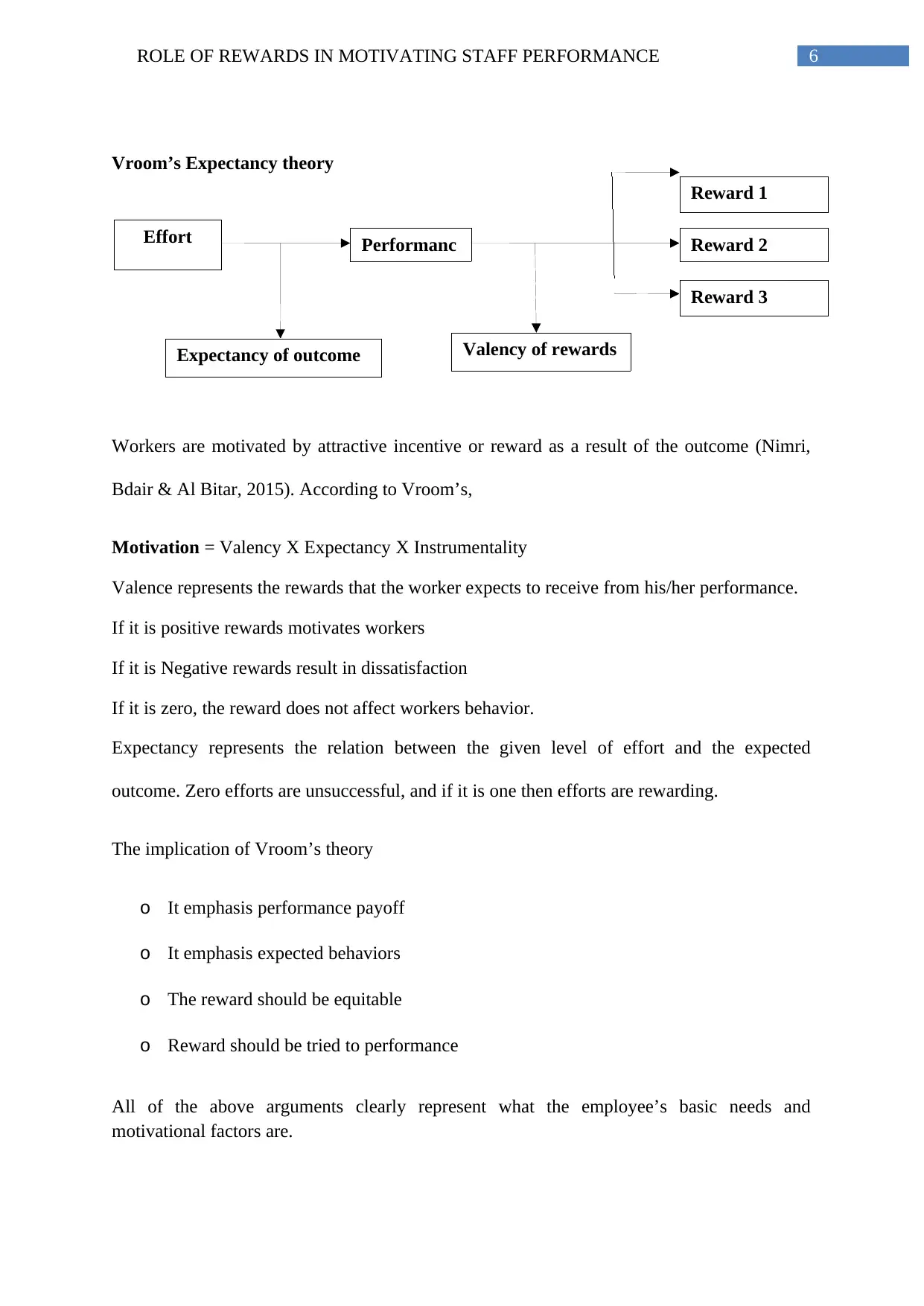
6ROLE OF REWARDS IN MOTIVATING STAFF PERFORMANCE
Vroom’s Expectancy theory
Workers are motivated by attractive incentive or reward as a result of the outcome (Nimri,
Bdair & Al Bitar, 2015). According to Vroom’s,
Motivation = Valency X Expectancy X Instrumentality
Valence represents the rewards that the worker expects to receive from his/her performance.
If it is positive rewards motivates workers
If it is Negative rewards result in dissatisfaction
If it is zero, the reward does not affect workers behavior.
Expectancy represents the relation between the given level of effort and the expected
outcome. Zero efforts are unsuccessful, and if it is one then efforts are rewarding.
The implication of Vroom’s theory
o It emphasis performance payoff
o It emphasis expected behaviors
o The reward should be equitable
o Reward should be tried to performance
All of the above arguments clearly represent what the employee’s basic needs and
motivational factors are.
Effort Performanc
e
Expectancy of outcome Valency of rewards
Reward 1
Reward 2
Reward 3
Vroom’s Expectancy theory
Workers are motivated by attractive incentive or reward as a result of the outcome (Nimri,
Bdair & Al Bitar, 2015). According to Vroom’s,
Motivation = Valency X Expectancy X Instrumentality
Valence represents the rewards that the worker expects to receive from his/her performance.
If it is positive rewards motivates workers
If it is Negative rewards result in dissatisfaction
If it is zero, the reward does not affect workers behavior.
Expectancy represents the relation between the given level of effort and the expected
outcome. Zero efforts are unsuccessful, and if it is one then efforts are rewarding.
The implication of Vroom’s theory
o It emphasis performance payoff
o It emphasis expected behaviors
o The reward should be equitable
o Reward should be tried to performance
All of the above arguments clearly represent what the employee’s basic needs and
motivational factors are.
Effort Performanc
e
Expectancy of outcome Valency of rewards
Reward 1
Reward 2
Reward 3
Paraphrase This Document
Need a fresh take? Get an instant paraphrase of this document with our AI Paraphraser
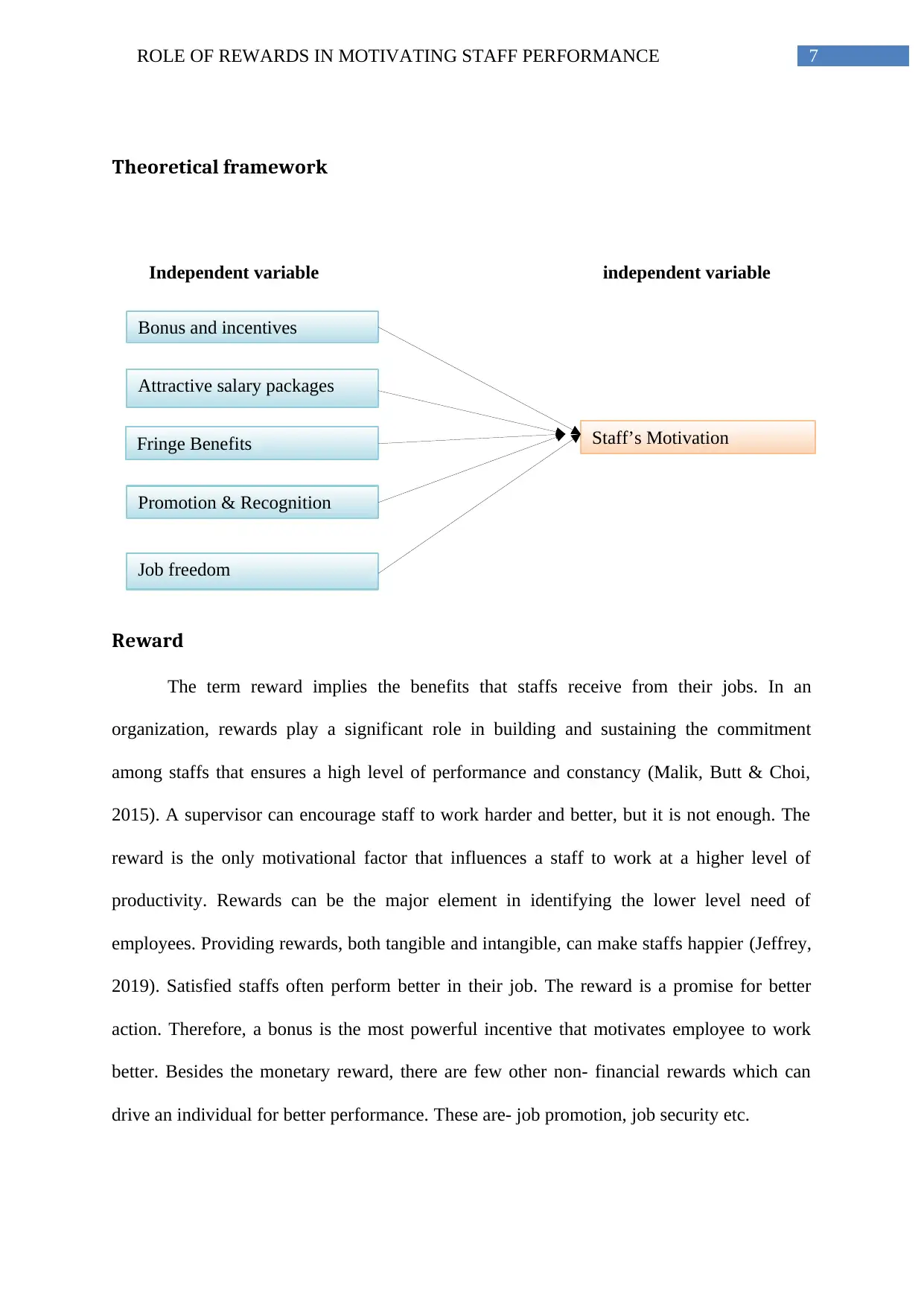
7ROLE OF REWARDS IN MOTIVATING STAFF PERFORMANCE
Bonus and incentives
Attractive salary packages
Fringe Benefits
Promotion & Recognition
Job freedom
Staff’s Motivation
Theoretical framework
Independent variable independent variable
Reward
The term reward implies the benefits that staffs receive from their jobs. In an
organization, rewards play a significant role in building and sustaining the commitment
among staffs that ensures a high level of performance and constancy (Malik, Butt & Choi,
2015). A supervisor can encourage staff to work harder and better, but it is not enough. The
reward is the only motivational factor that influences a staff to work at a higher level of
productivity. Rewards can be the major element in identifying the lower level need of
employees. Providing rewards, both tangible and intangible, can make staffs happier (Jeffrey,
2019). Satisfied staffs often perform better in their job. The reward is a promise for better
action. Therefore, a bonus is the most powerful incentive that motivates employee to work
better. Besides the monetary reward, there are few other non- financial rewards which can
drive an individual for better performance. These are- job promotion, job security etc.
Bonus and incentives
Attractive salary packages
Fringe Benefits
Promotion & Recognition
Job freedom
Staff’s Motivation
Theoretical framework
Independent variable independent variable
Reward
The term reward implies the benefits that staffs receive from their jobs. In an
organization, rewards play a significant role in building and sustaining the commitment
among staffs that ensures a high level of performance and constancy (Malik, Butt & Choi,
2015). A supervisor can encourage staff to work harder and better, but it is not enough. The
reward is the only motivational factor that influences a staff to work at a higher level of
productivity. Rewards can be the major element in identifying the lower level need of
employees. Providing rewards, both tangible and intangible, can make staffs happier (Jeffrey,
2019). Satisfied staffs often perform better in their job. The reward is a promise for better
action. Therefore, a bonus is the most powerful incentive that motivates employee to work
better. Besides the monetary reward, there are few other non- financial rewards which can
drive an individual for better performance. These are- job promotion, job security etc.
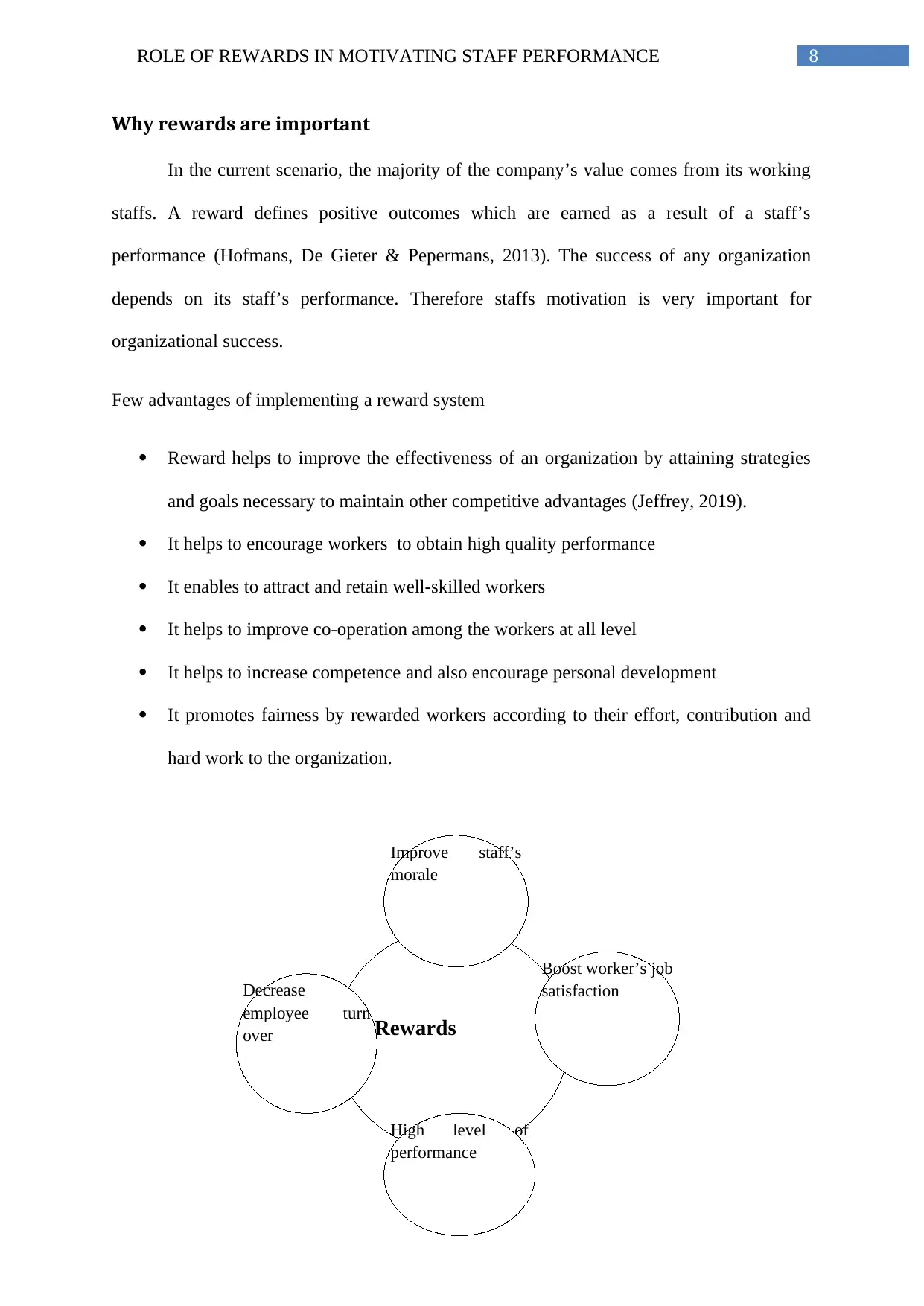
8ROLE OF REWARDS IN MOTIVATING STAFF PERFORMANCE
Why rewards are important
In the current scenario, the majority of the company’s value comes from its working
staffs. A reward defines positive outcomes which are earned as a result of a staff’s
performance (Hofmans, De Gieter & Pepermans, 2013). The success of any organization
depends on its staff’s performance. Therefore staffs motivation is very important for
organizational success.
Few advantages of implementing a reward system
Reward helps to improve the effectiveness of an organization by attaining strategies
and goals necessary to maintain other competitive advantages (Jeffrey, 2019).
It helps to encourage workers to obtain high quality performance
It enables to attract and retain well-skilled workers
It helps to improve co-operation among the workers at all level
It helps to increase competence and also encourage personal development
It promotes fairness by rewarded workers according to their effort, contribution and
hard work to the organization.
Rewards
Improve staff’s
morale
Decrease
employee turn
over
Boost worker’s job
satisfaction
High level of
performance
Why rewards are important
In the current scenario, the majority of the company’s value comes from its working
staffs. A reward defines positive outcomes which are earned as a result of a staff’s
performance (Hofmans, De Gieter & Pepermans, 2013). The success of any organization
depends on its staff’s performance. Therefore staffs motivation is very important for
organizational success.
Few advantages of implementing a reward system
Reward helps to improve the effectiveness of an organization by attaining strategies
and goals necessary to maintain other competitive advantages (Jeffrey, 2019).
It helps to encourage workers to obtain high quality performance
It enables to attract and retain well-skilled workers
It helps to improve co-operation among the workers at all level
It helps to increase competence and also encourage personal development
It promotes fairness by rewarded workers according to their effort, contribution and
hard work to the organization.
Rewards
Improve staff’s
morale
Decrease
employee turn
over
Boost worker’s job
satisfaction
High level of
performance
⊘ This is a preview!⊘
Do you want full access?
Subscribe today to unlock all pages.

Trusted by 1+ million students worldwide
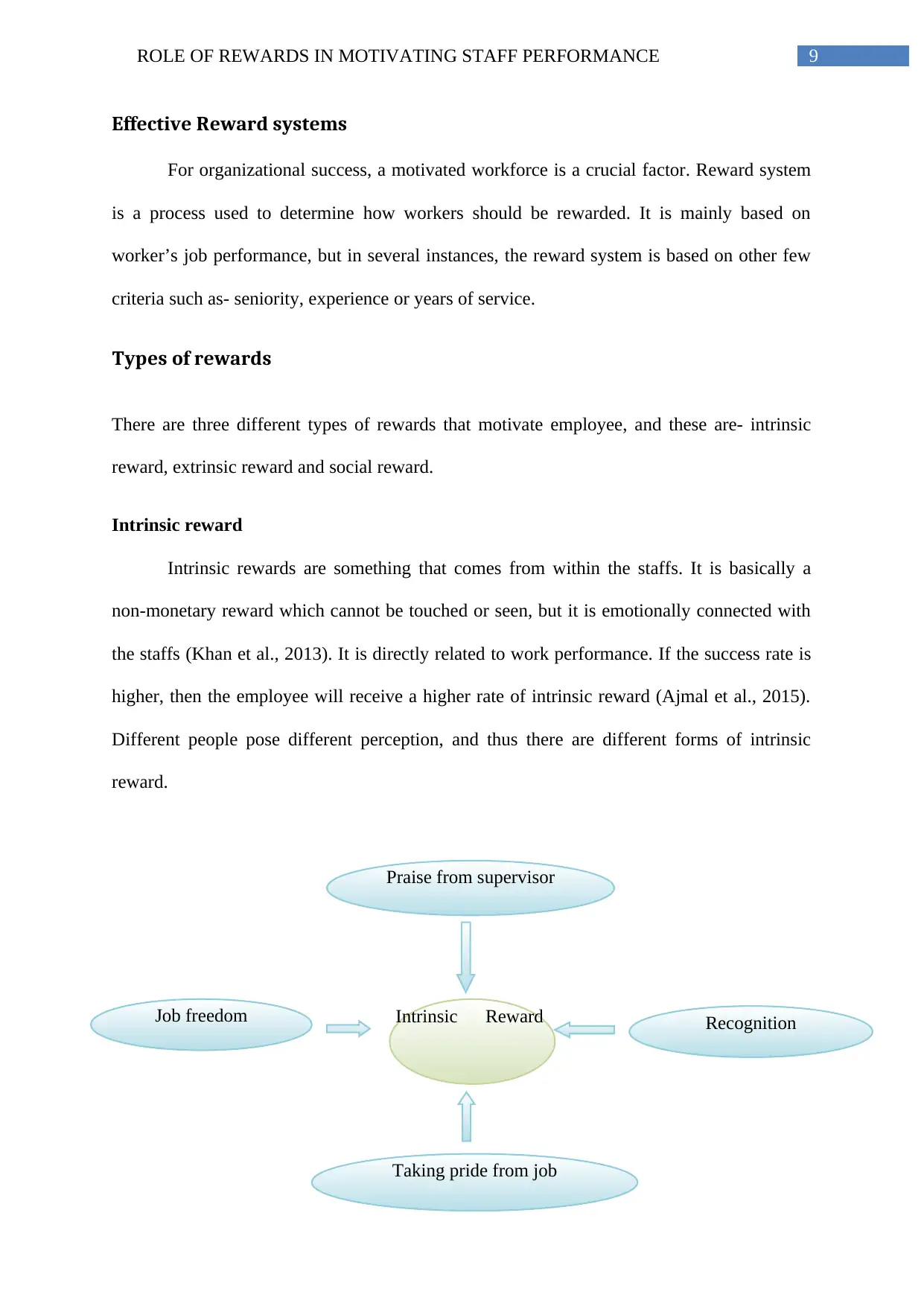
9ROLE OF REWARDS IN MOTIVATING STAFF PERFORMANCE
Praise from supervisor
RecognitionJob freedom
Taking pride from job
Effective Reward systems
For organizational success, a motivated workforce is a crucial factor. Reward system
is a process used to determine how workers should be rewarded. It is mainly based on
worker’s job performance, but in several instances, the reward system is based on other few
criteria such as- seniority, experience or years of service.
Types of rewards
There are three different types of rewards that motivate employee, and these are- intrinsic
reward, extrinsic reward and social reward.
Intrinsic reward
Intrinsic rewards are something that comes from within the staffs. It is basically a
non-monetary reward which cannot be touched or seen, but it is emotionally connected with
the staffs (Khan et al., 2013). It is directly related to work performance. If the success rate is
higher, then the employee will receive a higher rate of intrinsic reward (Ajmal et al., 2015).
Different people pose different perception, and thus there are different forms of intrinsic
reward.
Intrinsic Reward
Praise from supervisor
RecognitionJob freedom
Taking pride from job
Effective Reward systems
For organizational success, a motivated workforce is a crucial factor. Reward system
is a process used to determine how workers should be rewarded. It is mainly based on
worker’s job performance, but in several instances, the reward system is based on other few
criteria such as- seniority, experience or years of service.
Types of rewards
There are three different types of rewards that motivate employee, and these are- intrinsic
reward, extrinsic reward and social reward.
Intrinsic reward
Intrinsic rewards are something that comes from within the staffs. It is basically a
non-monetary reward which cannot be touched or seen, but it is emotionally connected with
the staffs (Khan et al., 2013). It is directly related to work performance. If the success rate is
higher, then the employee will receive a higher rate of intrinsic reward (Ajmal et al., 2015).
Different people pose different perception, and thus there are different forms of intrinsic
reward.
Intrinsic Reward
Paraphrase This Document
Need a fresh take? Get an instant paraphrase of this document with our AI Paraphraser
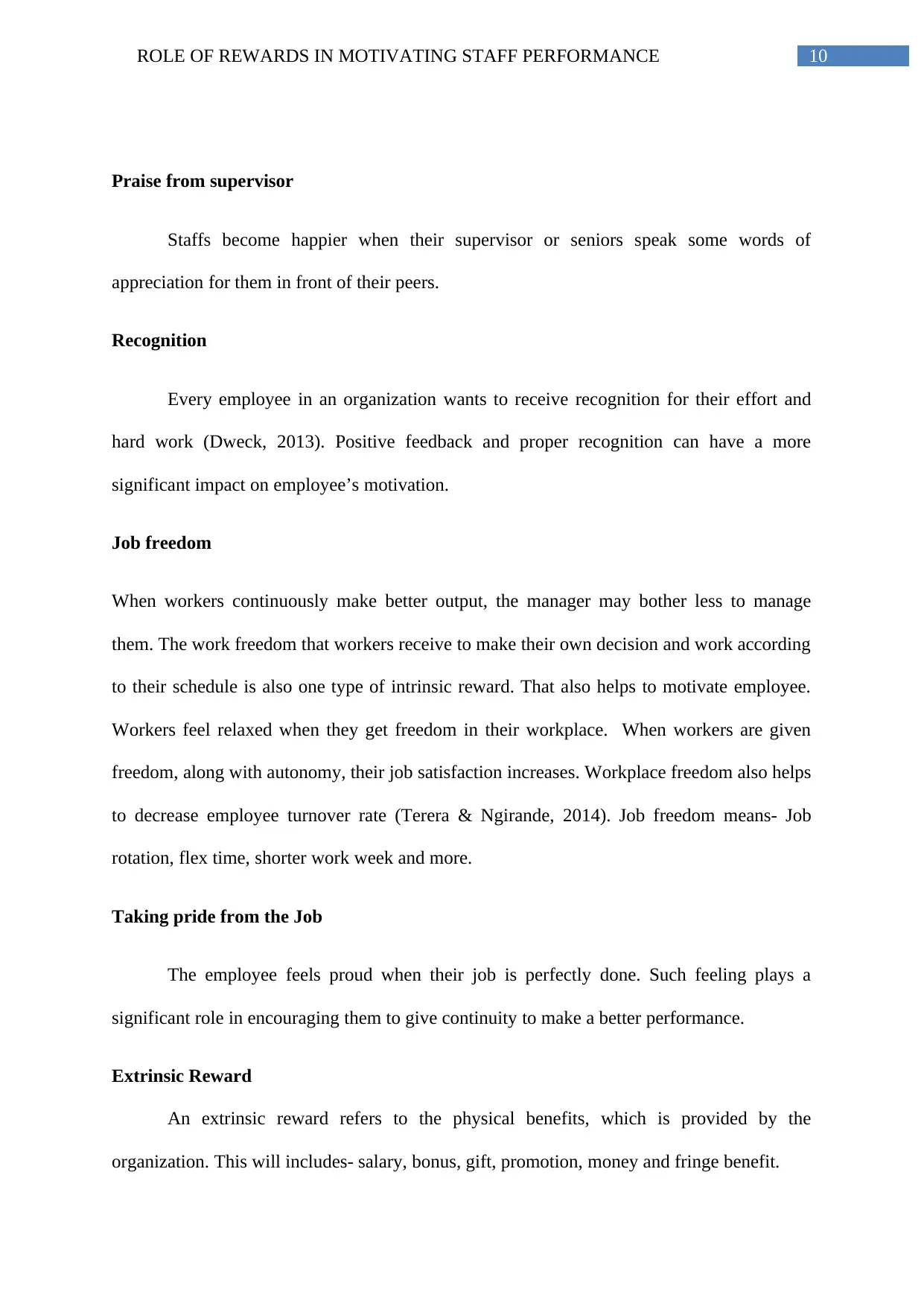
10ROLE OF REWARDS IN MOTIVATING STAFF PERFORMANCE
Praise from supervisor
Staffs become happier when their supervisor or seniors speak some words of
appreciation for them in front of their peers.
Recognition
Every employee in an organization wants to receive recognition for their effort and
hard work (Dweck, 2013). Positive feedback and proper recognition can have a more
significant impact on employee’s motivation.
Job freedom
When workers continuously make better output, the manager may bother less to manage
them. The work freedom that workers receive to make their own decision and work according
to their schedule is also one type of intrinsic reward. That also helps to motivate employee.
Workers feel relaxed when they get freedom in their workplace. When workers are given
freedom, along with autonomy, their job satisfaction increases. Workplace freedom also helps
to decrease employee turnover rate (Terera & Ngirande, 2014). Job freedom means- Job
rotation, flex time, shorter work week and more.
Taking pride from the Job
The employee feels proud when their job is perfectly done. Such feeling plays a
significant role in encouraging them to give continuity to make a better performance.
Extrinsic Reward
An extrinsic reward refers to the physical benefits, which is provided by the
organization. This will includes- salary, bonus, gift, promotion, money and fringe benefit.
Praise from supervisor
Staffs become happier when their supervisor or seniors speak some words of
appreciation for them in front of their peers.
Recognition
Every employee in an organization wants to receive recognition for their effort and
hard work (Dweck, 2013). Positive feedback and proper recognition can have a more
significant impact on employee’s motivation.
Job freedom
When workers continuously make better output, the manager may bother less to manage
them. The work freedom that workers receive to make their own decision and work according
to their schedule is also one type of intrinsic reward. That also helps to motivate employee.
Workers feel relaxed when they get freedom in their workplace. When workers are given
freedom, along with autonomy, their job satisfaction increases. Workplace freedom also helps
to decrease employee turnover rate (Terera & Ngirande, 2014). Job freedom means- Job
rotation, flex time, shorter work week and more.
Taking pride from the Job
The employee feels proud when their job is perfectly done. Such feeling plays a
significant role in encouraging them to give continuity to make a better performance.
Extrinsic Reward
An extrinsic reward refers to the physical benefits, which is provided by the
organization. This will includes- salary, bonus, gift, promotion, money and fringe benefit.
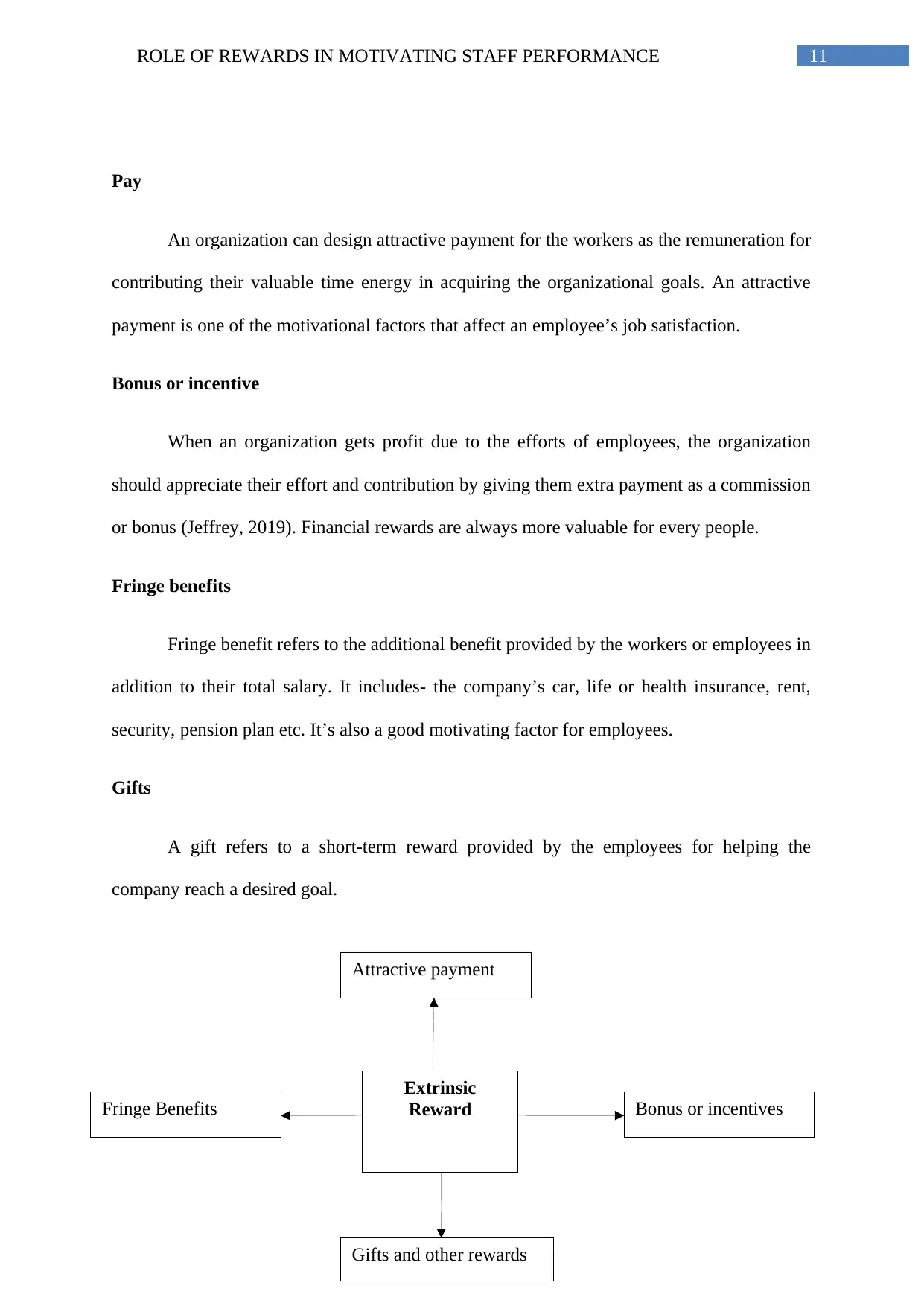
11ROLE OF REWARDS IN MOTIVATING STAFF PERFORMANCE
Extrinsic
Reward
Attractive payment
Gifts and other rewards
Fringe Benefits Bonus or incentives
Pay
An organization can design attractive payment for the workers as the remuneration for
contributing their valuable time energy in acquiring the organizational goals. An attractive
payment is one of the motivational factors that affect an employee’s job satisfaction.
Bonus or incentive
When an organization gets profit due to the efforts of employees, the organization
should appreciate their effort and contribution by giving them extra payment as a commission
or bonus (Jeffrey, 2019). Financial rewards are always more valuable for every people.
Fringe benefits
Fringe benefit refers to the additional benefit provided by the workers or employees in
addition to their total salary. It includes- the company’s car, life or health insurance, rent,
security, pension plan etc. It’s also a good motivating factor for employees.
Gifts
A gift refers to a short-term reward provided by the employees for helping the
company reach a desired goal.
Extrinsic
Reward
Attractive payment
Gifts and other rewards
Fringe Benefits Bonus or incentives
Pay
An organization can design attractive payment for the workers as the remuneration for
contributing their valuable time energy in acquiring the organizational goals. An attractive
payment is one of the motivational factors that affect an employee’s job satisfaction.
Bonus or incentive
When an organization gets profit due to the efforts of employees, the organization
should appreciate their effort and contribution by giving them extra payment as a commission
or bonus (Jeffrey, 2019). Financial rewards are always more valuable for every people.
Fringe benefits
Fringe benefit refers to the additional benefit provided by the workers or employees in
addition to their total salary. It includes- the company’s car, life or health insurance, rent,
security, pension plan etc. It’s also a good motivating factor for employees.
Gifts
A gift refers to a short-term reward provided by the employees for helping the
company reach a desired goal.
⊘ This is a preview!⊘
Do you want full access?
Subscribe today to unlock all pages.

Trusted by 1+ million students worldwide
1 out of 22
Related Documents
Your All-in-One AI-Powered Toolkit for Academic Success.
+13062052269
info@desklib.com
Available 24*7 on WhatsApp / Email
![[object Object]](/_next/static/media/star-bottom.7253800d.svg)
Unlock your academic potential
Copyright © 2020–2026 A2Z Services. All Rights Reserved. Developed and managed by ZUCOL.




